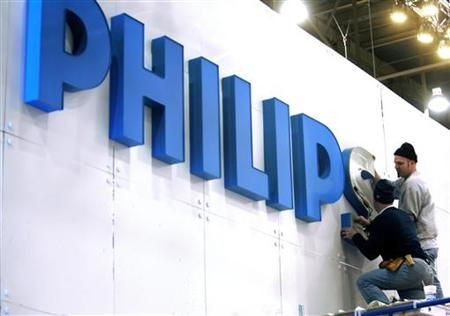Philips Swings to Loss as Europe's Economy Falters

(REUTERS) -- Philips swung to a fourth-quarter net loss as government cuts ate into its healthcare equipment business and a slowdown in European construction activity and consumer spending hit its lighting operations.
Europe's largest consumer electronics maker posted a net loss of 160 million euros ($210 million) after a profit of 465 million a year earlier, and the group said prospects for this year were no brighter.
We are cautious about 2012, given the uncertainty in the global economy, and Europe in particular, chief executive Frans van Houten said on Monday.
Our fourth-quarter results were impacted by weak European sales, postponement in deliveries of existing orders in our healthcare sector, and inventory correction actions and other operational issues in our lighting business.
Philips said it was committed to its 2013 goals and underlying margins would improve in the latter part of 2012, but analysts including S&P Equity Research's James Crawshaw were skeptical of next year's targets and said the second half improvement was at risk from challenges in the lighting division as the industry moves to light-emitting diodes (LED).
We anticipate ongoing losses at the components arm, Lumileds, and rising competition in the LED lighting market from Korean and Chinese vendors, said Crawshaw.
EUROPEAN PINCH
Philips makes almost 30 percent of its sales in Europe, where they fell 5 percent in the fourth quarter. Government austerity programs there are squeezing hospital budgets, and some have put orders for the latest equipment on hold.
European consumers are increasingly reluctant to spend, hitting sales of Philips lightbulbs and gadgets like electric toothbrushes and shavers, leaving huge amounts of unsold stock.
Austerity measures are also putting a damper on European construction, and developers are holding back on kitting out complexes with the latest lighting systems.
Philips also blamed supply chain speed bumps at its lighting unit, as it increases production of energy efficiency lights and LEDs, which use semiconductors, for falling sales at one of its key units.
Group sales for the quarter were up 3 percent on the same period last year, led by 12 percent higher sales in emerging markets, where Philips now makes 33 percent of its sales.
A 128 million euro charge for rebranding a consumer light product, unspecified group restructuring, writedowns on lighting inventory, and losses at the TV business all hit underlying profit, which fell 45 percent from the same quarter a year ago.
The latest quarterly results from the company are in line with a profit warning earlier this month.
SECOND-HALF HOPES
The firm said on Monday previously announced restructuring measures, including 4,500 job cuts, would help it weather the weakness in its markets and it forecast some improvement in underlying margins by the end of this year, excluding the impact of further restructuring charges it expects to take.
The first half of 2012 will see the impact of these charges, and overall we are cautious about the development of the first half of the year. It is not going to be an easy first half, van Houten said.
Since van Houten took the top job in April, he has issued two profit warnings, reset financial targets, slashed jobs, seen several top executives replaced and tried to hive off the loss-making TV business.
Van Houten said he was confident the sale of the TV business, which needs to be approved by the shareholders of Hong Kong-based TPV and regulators, would close in the first quarter.
TPV shareholders will vote on the deal on February 22. Philips booked a 272 million loss for the TV unit in the fourth quarter.
The company's share price, down 2.6 percent at 15.17 euros at 1544 on Monday, has fallen 32 percent from a year ago, prompting some analysts to say the 120-year old company might be more valuable to shareholders if it were split into three separate parts, but CEO Van Houten said on Monday there were absolutely no break-up plans.
He said the near-term plan was to continue restructuring and cutting costs and to improve performance, which will put the group in a better position to look for acquisitions.
The Dutch group competes with Samsung and LG Electronics among others in consumer electronics, and with General Electric and Siemens in the hospital and lighting markets.
($1 = 0.7615 euros)
© Copyright Thomson Reuters 2024. All rights reserved.




















